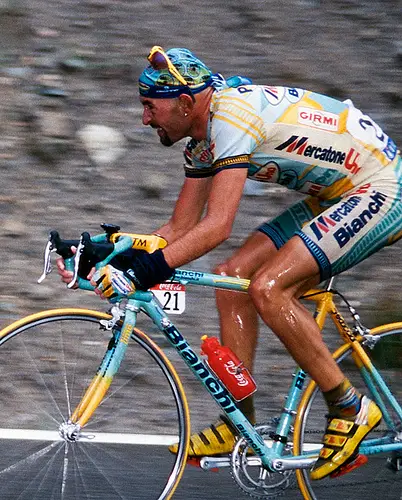 |
| pic from cycling-passion.com |
Pantani was oft compared to an artist; Lance Armstrong called him the Salvador Dali of cycling. He rode with unbridled panache, making crazy decisions to attack based on gut feeling, eschewing modern training and racing aids such as the heart-rate monitor.
However, as the French Senate confirmed on Wednesday Pantani also doped, in this case with EPO, during the 1998 edition of the Tour de France, which he won. Pantani wasn’t alone in his indiscretions: second-placed rider that year, Jan Ulrich, also retroactively tested positive for EPO, as did the American, Bobby Julich, who finished third. It was just those three, and all the rest – the ’98 Tour will forever be synonymous with the Festina affair. Watchmaker Festina was the title sponsor of the team whose soigneur was caught with performance enhancing drugs prior to the race start. The arrest lifted the lid on the sport’s pharmaceutical underbelly and triggered the greatest scandal cycling would see for, well, until the next scandal.
When Drew and I headed over to Italy and France to ride in Pantani's (and other heroes' wheel-tracks) Marco was already dead and buried (he died of a cocaine overdose on Valentine’s Day 2004). We were under no illusions as to the problems our sport had faced in the nineties and noughties and, hopefully to a lesser degree, continues to face to this day. That bleak knowledge didn’t stop me (Drew was less forgiving) from appreciating the cyclist Pantani had been. We'll never know what Marco was truly capable of when riding pane e acqua (on bread and water) but the same could be said for the majority of the man’s contemporaries. His was an era of doubt, a generation of pro cyclists to whom the syringe was second nature.
A decade and a half on from Pantani’s Tour win, my admiration for the man has settled on a state of resigned incongruousness. On the one had he was a cycling genius, on the other a doping cheat.
Why do many cycling fans (myself included) so often allow our good opinions of Pantani to override the bad, whereas for someone like Lance Armstrong, the bad always seems to come up trumps? Isn't that just a tad hypocritical? Perhaps it's down to simple human empathy: Pantani appeared to be crushed by the system, was vilified and eventually destroyed by the game, (despite playing along with the rules that everyone else was secretly following), wiped away by his own personal demons. Armstrong, so it seemed, was the system, a man superior to the rules – he was the one doing the crushing.
Whatever path cycling follows from here and whatever revelations are left to come, my Pantani memories will forever revolve around watching the TV, incredulous as Il Pirata attacked the slopes of the Galibier, Peyresourde, Plateau de Beille, etc, gawping and gazing as the diminutive man cut mountains down to the size of molehills. There’s so much beauty in cycling, it’s hard not to allow it to override the bullshit.
I wondered idly what the climb to Les Deux Alpes had meant to Pantani, after the fact, long down the road, when the Tour glory had faded and frayed. In his final years he’d endured far tougher battles off the bike, much of which might well have obscured his view of past sporting success. When riding at his best, Pantani had exhibited an excess of grinta, but as time went on, as his troubles mounted, that strength appeared to diminish. In the grand scheme of things, the man's battles on a bicycle were nothing in comparison to his struggle with depression and drug addiction. I wondered again, a step further: now that he is cruising in the big ring, up there with the angels, does he look back down and see cycling as mere frivolity? Or does the celestial Pantani see the inherent beauty, the almost spiritual qualities of the pedal-powered experience? As I chased after Drew on the road to Les Deux Alpes, I hoped for the latter, wanted and felt (even on this relatively unremarkable road) just a little meaning in my mountain.

No comments:
Post a Comment